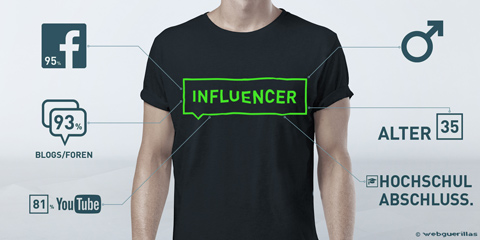Gender and education influence recommendation behavior on the social web
Webguerillas and the Macromedia University of Applied Sciences have analyzed a study on influencers in Germany socio-demographically and show:Two socio-demographic characteristics significantly shape the recommendation behavior of influencers: gender and education.
Female influencers communicate differently on the social web than male influencers. Women like their favorite messages and share them in their network, while men tend to write more posts and comments. The level of education also plays a significant role in one's own communication: Multipliers with a degree post more of their own content than those with less formal education. In terms of age, young adults between 25 and 34 dominate. These are the two core findings of a recent evaluation of the study "Brand Recommendations in Social Media" by Macromedia University and Webguerillas. A representative online survey of 2,000 respondents between the ages of 18 and 65 was used to examine recommendation behavior in social media.
An influencer in social media is someone who has made a brand recommendation or a negative brand statement via social media at least once in the last six months and who is also particularly well connected on the social web, has above-average brand awareness and a reputation as a market expert. Influencers include around nine percent of 18 to 65-year-olds in Germany - that's 4.6 million people. The average influencer is over 35, male and has a university degree. The most popular platform in this group, which is so sought-after by the advertising industry, is Facebook; 95 percent use it daily. It is followed by blogs and forums (93 percent) and YouTube (81 percent). Twitter (59 percent) comes in a distant second.

Men stage themselves more strongly than women on the social web
"Women and men live out their expertise on the social web in markedly different ways," explains Prof. Dr. Dr. Castulus Kolo, scientific project manager and dean of the Macromedia University of Applied Sciences, "Men are more extroverted here and more keen to shape opinions, while women act more subtly - and this applies to all major platforms. On Facebook, for example, 66 percent and 63 percent of male influencers comment and post regularly. For women, the figures are 56 percent and 42 percent, respectively. When it comes to liking and sharing Facebook content, women are again slightly ahead - with 75 to 71 and 69 to 63 percent respectively. A similar picture emerges for blogs and forums: men tend to write more of their own posts (53 vs. 49 percent) and comment more often (68 vs. 62 percent). The same applies to YouTube: Every second male, but only every third female influencer regularly comments on videos.

The higher the level of education, the more content the user produces.
Influencers with a university degree are the most active on all the platforms surveyed. On Facebook, the differences are particularly clear: 52 percent of influencers with a university degree regularly post their own content - among influencers with only an education, secondary school diploma or high school diploma, the figure does not exceed 33 percent. Accordingly, influencers with a university degree participate most on blogs and forums: 71 percent write posts about their favorite brands, 82 percent comment on the posts of other users. For influencers with only a Mittlerer Reife /Abitur, the figures are 32 and 43 percent, respectively. The figures for influencers with only vocational training are also significantly lower than those for academics. Influencers with a university degree are also significantly more active on YouTube, with 58 percent of influencers with a university degree uploading their own videos, but only 33 percent each of those with an education or Mittlerer Reife/Abitur.
"Influencers are not a homogeneous group; they are fundamentally different. Just looking at the socio-demographic criteria shows how big the differences can be. Accordingly, influencer marketing must be designed in a differentiated way in order to fully exploit the interactions between product/brand, influencer and platforms," says David Eicher, CEO of Webguerillas.








